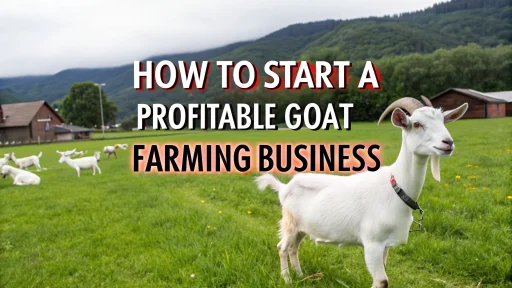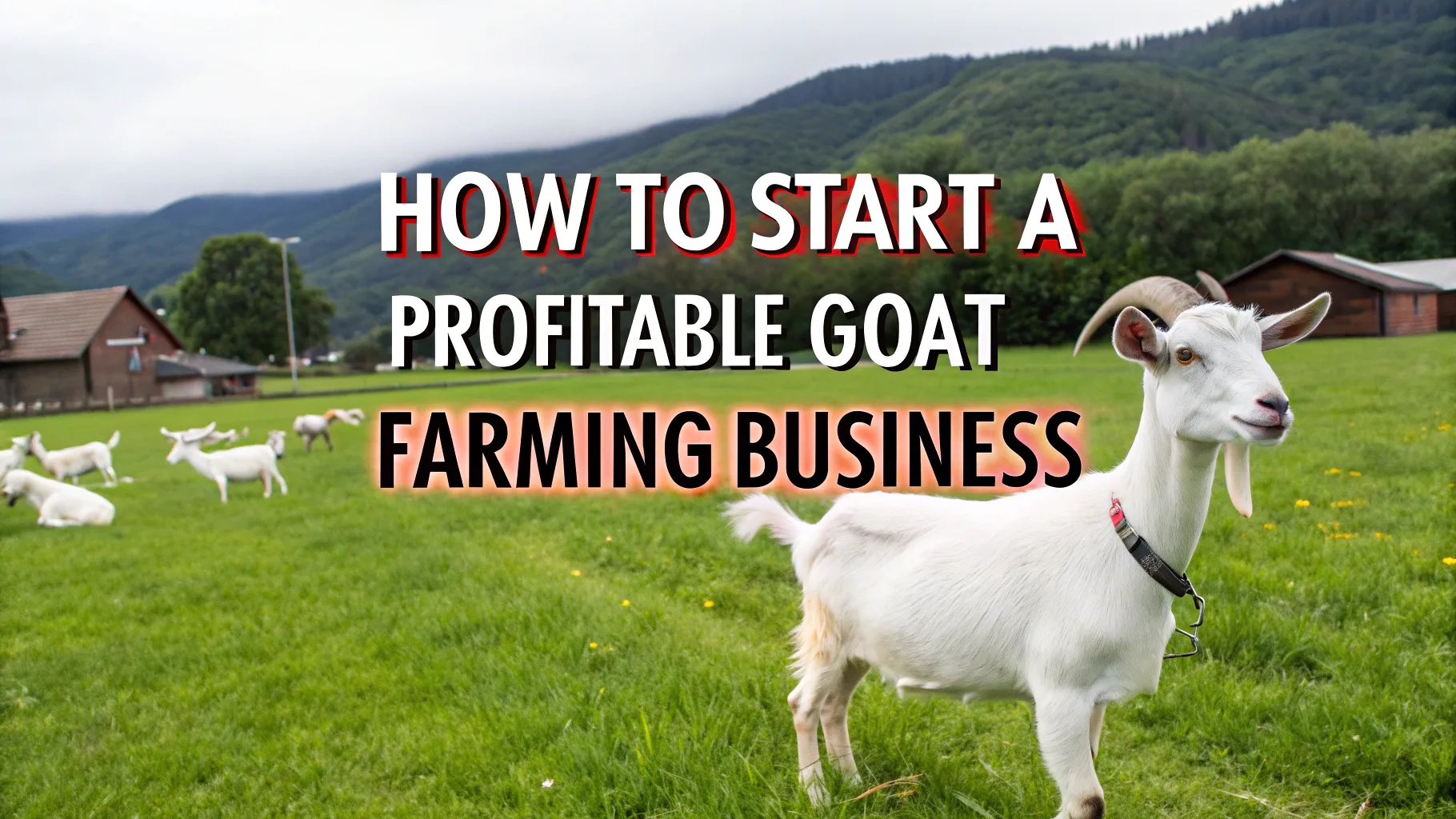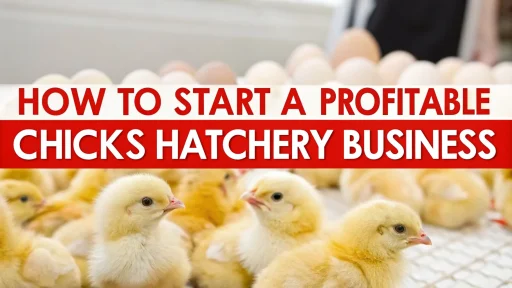Shifting perceptions towards goat farming Business is becoming an organized agribusiness, meeting the growing demands within the meat, milk, fiber, and manure markets. The increasing trend towards urban meat consumption, organic livestock farming, and the comparatively lower barriers to entry in goat farming, integrated with the agro-climatic conditions and traditional practices in India, make it more accessible.
This article will provide a detailed analysis of the techno-economic feasibility of goat farming and will be particularly helpful to startup founders, agripreneurs, and rural industrialists in identifying the market potential, business dynamics, technical aspects, and scalability of the industry in the long run.
What is Driving Interest in Goat Farming?
New Goat farming business ideas and programs are rapidly rising in popularity across India. The increasing interest in goat farming is motivating agribusiness entrepreneurs towards the sector due to the multiple income opportunities and market adaptation. Goats are hardy animals that require low capital and are adaptable to a wide range of climates. The farming of meat, milk, leather, and manure makes it a great business.
For small farmers and first-generation rural entrepreneurs, this translates into a business model with consistent cash flow, manageable risk, and scalable returns.
The minimal reliance on imported technology or specialized feed makes goat farming particularly appealing, as it becomes less sensitive to market disruptions. In addition, the need for goat meat, or “chevon”, continues to increase both in the domestic market and abroad, which protects the price from too much volatility.
Related: How to Start a Profitable Goat Farming Business
Market Outlook: Demand and Growth Forecast for Goat Farming in India
The market for goat meat in India has an estimated value of ₹80000 crores and is projected to grow at a CAGR of 4.5% per annum. Industry estimates suggest:
| Year | Goat Meat Market Value (INR Cr) | CAGR (YoY) |
| 2022 | ₹72,000 | 4.2% |
| 2023 | ₹77,000 | 4.5% |
| 2024 | ₹80,000 | 4.5% |
| 2025 | ₹84,000 (Projected) | 5.0% |
| 2026 | ₹89,000 (Projected) | 5.1% |
With over 150 million goats, India has 25% of the total livestock population. It is the second highest producer of goat meat in the world, but the domestic demand is so high that exports are very low. This creates a strong entrepreneurial incentive for building structured and scalable goat farming businesses.
In addition, the strong domestic demand for organic and chemical-free meats and dairy products is also creating new high-end urban and export market opportunities.
Key Business Benefits of Starting a Goat Farming Business
Compared to large-scale poultry or dairy farms, goat farming is more flexible, rural-friendly, and can be scaled modularly. Starting with 25 to 50 goats is reasonable and can be built to a commercial herd size of 200 to 300 animals over a period of time.
Goats also provide key advantages over other livestock. They need less housing, have a lower feed-to-weight ratio, and are less prone to epidemic diseases compared to poultry and cattle. This reduces overhead, health risks, and increases operational efficiency.
Goat farming is also socially inclusive as a woman-led rural enterprise as well as community cooperatives. There are also several subsidies from the government available through NABARD’s livestock development initiatives as well as the Animal Husbandry Infrastructure Development Fund (AHIDF).
What Makes Goat Farming a Profitable Business:
Every goat farming business needs to have a strong technical, operational and economic business plan.
1. Operational Efficiency
In the case of goat farming, the technical setup can be considered the shelter, water, food, and veterinary services that a business unit requires. The unit can also hire a few trained workers. Goats thrive on natural vegetation, which stands to lower the operating costs of feed even further.
2. Opportunities within the Economy
Economically, the most productive goats are a source of meat and milk and create a stream of income through manure and breeding stock. Depending on the breed, a mature goat costs anywhere from ₹6,000–₹12,000. Effective herd management enables a farmer to achieve a good profit in a 12–18-month period.
3. Growth
Once the base herd is developed, the rotational breeding cycles, cooperative marketing models and even the partnership with fodder growing or other agribusinesses like goat cheese, ghee, or organic manure, will provide an opportunity for growing the business.
Goat Farming Process Overview
The process of goat farming is more modern than traditional, as the management of livestock is of the key importance. The core steps are highlighted below:
Choosing The Breed
The breed that is chosen is directly influenced by the purpose of the livestock, be it meat, milk or fiber. Meat goats consist of the Boer, Black Bengal, Sirohi and Jamunapari. The Barbari and Beetal are dual-purpose breeds.
Farm And Shelter
For goats, a shed that is ventilated and dry needs to be elevated in order to stop the disease and other hygiene problems. Based on the climate, a shed that is simple and has slatted floors and has basic divisions for breeding, kids, and sick animals is ideal.
Feeding and Nutrition
Offering a combination of green fodder, dry fodder, and concentrates is crucial. While free-range grazing has its advantages, stall feeding offers better management of their diet and weight gain. Clean water, along with mineral supplements, is also important.
View our Handbooks on the Livestock Business
Breeding and Herd Management
Goats are also known to be very reproductive, giving birth to 1-3 kids twice a year, and requiring good preventative health management of vaccinations and deworming. A good 1 25 buck-to-doe to doe ratio is also sustainable.
Marketing and Sales
Goats are easily sold to butchers, meat dealers, and livestock markets. Recently, online livestock markets and direct-to-consumer models are gaining popularity, especially during the Eid season when demand is at its peak.
Sustainability and Environmental Impact
Goat farming has a positive environmental impact. They are browsers, meaning that they eat weeds and bushes and do not destroy the soil, as cattle do. They also have lower methane emissions, are less resource-intensive, and their waste is a good organic fertilizer.
The integration of goat farming with agroforestry, organic vegetable farming, or even biogas production adds even more value to the circular economy.
Related: Business Plan of Layer Poultry Farming
Goat Farming: Challenges To Consider Before Starting
Goat farming is a low-cost business to start, but comes with several risks to manage:
- Peste des Petits Ruminants (PPR) and goat pox disease outbreaks.
- Seasonal and regional market price fluctuations.
- Dependable and inconsistent manual labor.
- Breeding cycle bottlenecks that slow scaling.
Each of these risks can be mitigated to a degree by various training, veterinary support, cooperative models, and government schemes, making the operation more sustainable.
For more information, check out this video
The Role of NIIR Project Consultancy Services (NPCS)
It is equally as important to evaluate market realities and long-term feasibility as it is to assess the technical processes to build a profitable and scalable goat farming business.
NPCS prepares Professional Market Survey cum Detailed Techno Economic Feasibility Reports to assist entrepreneurs in evaluating the potential of their proposed project. Niir rports contain information relating to the manufacturing process and its components, raw materials, the plant layout, as well as the detailed financials. NPCS aids project founders in assessing the technical, economic, and commercial feasibility of setting new industrial or agri-based businesses.
Find the Best Idea for Yourself With Our Startup Selector Tool
Conclusion: For Today’s Entrepreneurs, Is Goat Farming a Profitable Venture?
Definitely—goat farming is a profitable business opportunity for today’s agripreneurs. With the right planning, it is a scalable business along with employing modern methods of livestock management. Goat farming is one of the most promising ventures of this kind for rural entrepreneurs since it can generate a consistent income, requires limited land and capital, and is highly adaptable.
In India’s rapidly growing agri-livestock economy, starting entrepreneurs wanting goat farming can effectively blend profitability with a rural impact.







